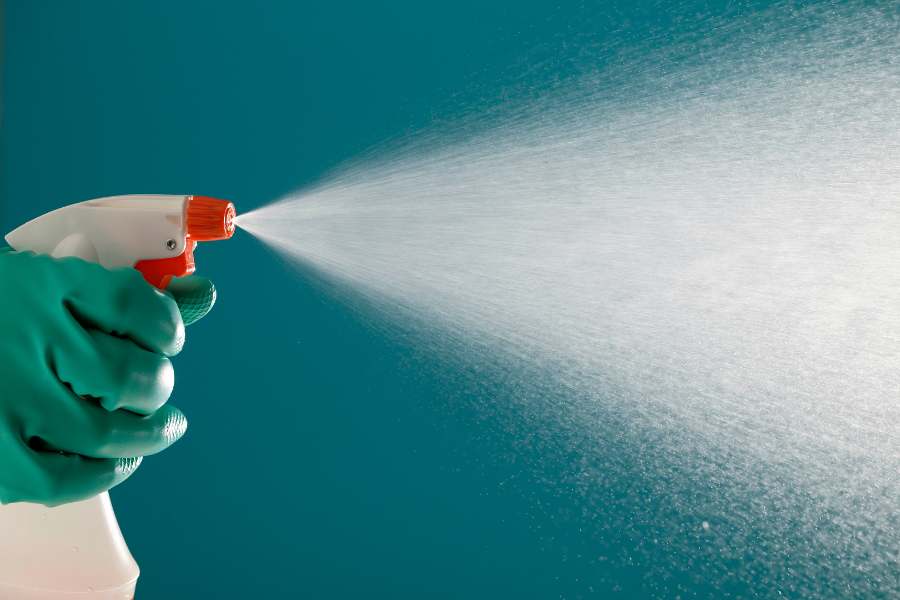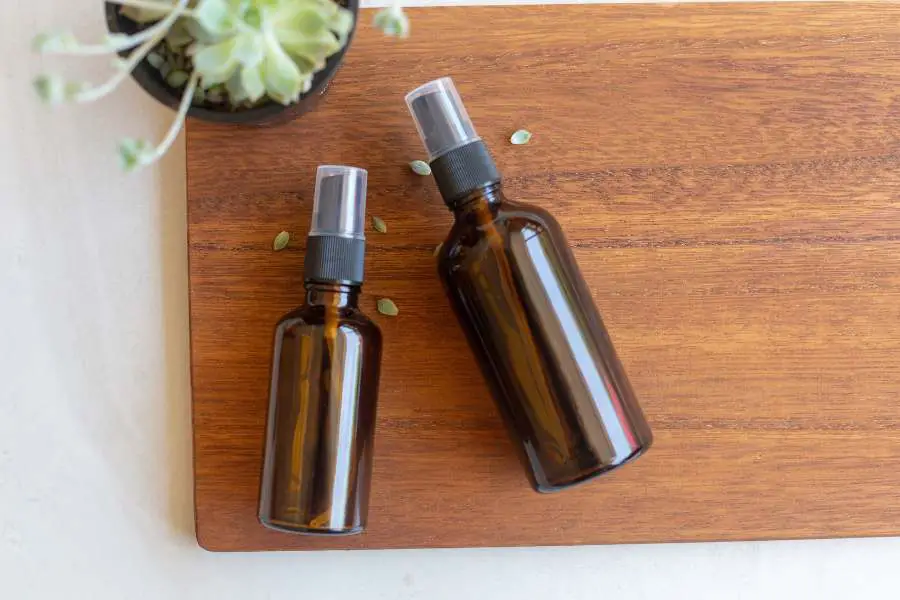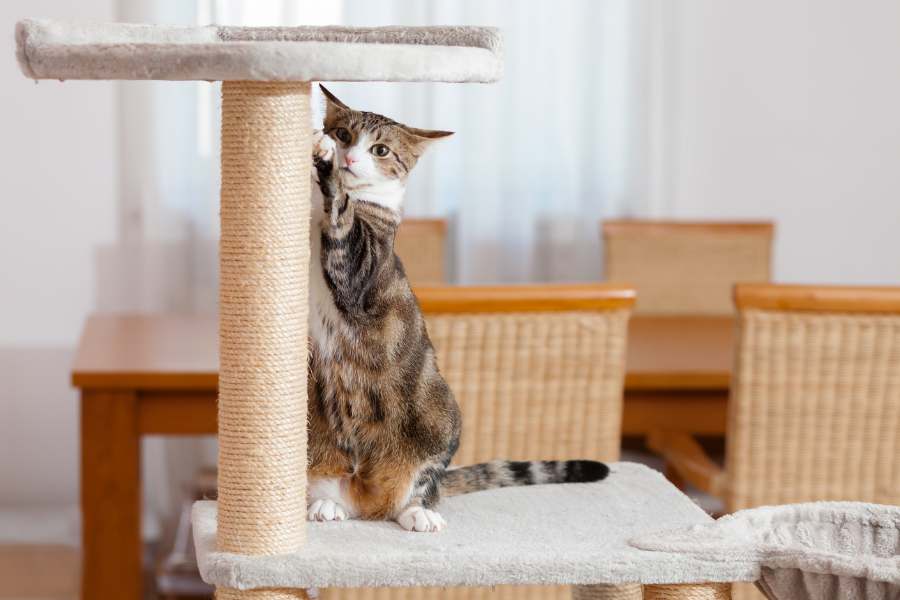Cats are instinctively wired to scratch hard, stable surfaces for a myriad of reasons, like exercising their torso, getting rid of the old layer on their nails, or simply spreading their scent with the smell glands between their paws. In addition, it is also typical for a cat to scratch just because it is looking for attention from the owner—in this case, some extra tenderness, love, and care will do.
In essence, scratching shows that the cat is healthy!
While it’s part of natural cat behavior, the scratching is still irritating, especially when it destroys your carpet, rug, curtains, or favorite couch.
You do not need to yell or scold the cat because that will not help. However, you can make homemade sprays to stop cats from scratching furniture or other surfaces.
Natural, homemade anti-scratch sprays for cats are meant to deter your cat from scratching specific surfaces. This post shows you simple ways to make cat repellent at home using locally available substances with odors that cats hate, like white vinegar and some essential oils.
Learn How To Clean Cat Vomit From Carpets
Benefits Of Homemade Cat Repellent Spray For Furniture, Carpet, & Curtains
Effective
Research shows that a cat’s olfactory cells are 14 times stronger than ours. While humans have about five million smell receptors in their noses, cats are known to have between 45 and 80 million; other cats have as many as 200 million odor receptors in their noses.
To the ordinary pet owner, the homemade cat repellent solutions we’ll delve into in this article may have a sweet, relaxing odor. However, to the cat, they are insufferably horrible, making them very effective at deterring it from scratching or even visiting certain places.
In addition, most homemade cat repellent solutions effectively keep insects at bay.
Non-Toxic
There is nothing better than using safe products for you, your kids, and your pets. The negative impacts of ingesting homemade products are less severe and toxic than those containing harsh chemicals like alcohol.
The all-natural ingredients used in making homemade cat anti-scratch repellents and sprays, such as water and vinegar solutions, are safe for the environment.
This is an essential consideration in a world going green to reduce environmental toxicity and waste.
Affordable
The price of most cat repellents on the shelves has increased as demand for commercial products sours. However, the cost of buying commercial cat repellents will rack up pretty quickly if you are a regular consumer of such products.
On the other hand, homemade solutions require locally available ingredients like orange peelings or vinegar and simple preparation procedures. Ultimately, you will make substantial cost savings in your pet ownership journey.
Simple To Make
You do not have to come up with complex chemical formulas to prepare an effective cat repellent. Homemade anti-scratch sprays for cats are easy to prepare using readily available ingredients and standard units of measure in your home, like tablespoons, grams, or ounces.
Also, the level of accuracy required to prepare an effective cat repellent at home is not significantly phenomenal in any way, and simple estimations will suffice.
A Chance To Be Creative
In truth, there is no one homemade cat repellent that works universally. But that is the beauty of it because the cat owner gets to mix different ingredients like garlic and pepper, try out new ‘recipes’ or increase the concentration of some of the liquids used like vinegar to find the solution that works for them.
For example, equal parts of water and vinegar can make an excellent cat-repellent spray. However, you can make an even stronger “dose” of the repellent by increasing the proportion of vinegar in the solution. Also, you can make a citrus-based homemade anti-scratch spray for cats by boiling peels from different fruits like tangerines and oranges and adding some lemon juice or a few drops of essential oils.
Let me put it this way; there are numerous ways of preparing an effective homemade cat repellent – you only need an idea of the smells your cat hates.
Smells That Cat Hate: Effective Ingredients For Homemade Anti-Scratch Spray For Cats

Generally, cats are repulsed by the smell of the following main substances:
- Vinegar (white or apple cider vinegar)
- Spices like garlic and pepper
- Citrus fruits (peels) like oranges, lemons, tangerines, limes, etc.
- Essential oils like rosemary, lavender, citronella, lemon essential oil, etc.
Below, we show you how to use these “ingredients” to prepare homemade sprays to stop cats from scratching furniture, carpets, rugs, or other surfaces at home. In some preparation procedures, you might require some lemon-based dishwashing soap.
Homemade Sprays Homemade Spray To Stop Cats From Scratching Furniture
1. How To Keep Cats From Scratching Furniture Using Vinegar As A Cat Repellent

Pet cat owners can use vinegar to deter their cats from scratching on some surfaces. You can prepare a vinegar cat repellent by mixing equal parts of water and vinegar as shown below:
Requirements:
- Vinegar (apple cider or white vinegar)
- Water (water could be purified, bottled, filtered, or tap water)
- 1 Spray bottle
- Lemon-scented dish soap
- How To Keep Cats Off Furniture With Vinegar Cat Repellent
Procedure
Step 1: Mix water and vinegar into a spray bottle in equal parts, i.e., 50% to 50%, and add two tablespoons of lemon-dish soap to the solution. Close the bottle and gently shake it to allow the solution to mix. If you must, you can increase the vinegar concentration to develop a more potent vinegar cat repellent.
Step 2: To avoid staining your carpet or favorite couch, test the solution on an inconspicuous area of the carpet or rug and allow it to dry. If their solution does not stain or damage the spot, you can proceed to step 3.
Step 3: Spritz the solution directly over the area where your cat likes to scratch. Ordinarily, the pungent smell of vinegar lasts for about ten days. However, you may apply the vinegar cat repellent twice or thrice daily, depending on how your cat responds. Do not spray directly on plants.
In addition, you may have to apply the vinegar solution every day until there is a positive change in your cat’s scratching behavior.
Also note that the efficacy of this method depends on your cat’s urge to scratch, the concentration of the vinegar cat repellent, and how regularly you apply the repellent.
2. Citrus Homemade Anti-scratch Spray
The citrus fruits you can use to make a homemade citrus anti-scratch spray are orange, grapefruit, lemon, lime, tangerine, and lemongrass. The smell of citrus fruits, peelings, or juice greatly deters cats. However, as shown in the procedure below, you might need to boil the peelings and add a little lemon juice.
How To Keep Cats Off Furniture With Citrus Homemade Anti-scratch Spray
Requirements:
- Half a liter of water
- About 100g of chopped orange or lemon peels (other citrus fruits: you can use other fruits like lime, tangerine, or grapefruit)
- Lemon-scented dish soap
- 2 teaspoons of lemon juice
Procedure
Step #1: Put water in a boiling pot and heat it at medium-high or high heat until it starts to boil.
Step #2: Place the chopped lemon peels into the boiling water, reduce the heat, and cover the pot with a lid to allow simmering for 20 minutes (or 10 minutes if you are using high heat).
Step #3: Remove the lid to stir the solution, then replace the lid and turn off the heat. Allow the solution to cool completely.
Step #4: Using a suitable sieve or filtering funnel, pour the solution into a spray bottle, add the lemon juice, and add a tablespoon of dish soap.
Step #5: Shake the solution gently for the solution to mix thoroughly. At this point, your citrus-based homemade cat repellent is ready. It will have an estimated two-week “shelf life” when stored in a cool, dry place.
Step #6: You will need to test the solution in a low-traffic area. Also, shake the solution a little before every use. Then, spray directly on areas where your cat likes to scratch. You might need to reapply multiple times, depending on how the cat responds.
3. Essential Oil Cat Repellent

Many cat owners prefer rosemary essential oil because it is considered safe for cats. You can also use citronella, lavender, peppermint, lemongrass, cinnamon, and eucalyptus essential oils.
Ensure you or any other household member are not sensitive to essential oils. Also, note that some essential oils can be toxic to cats when ingested – be careful to negate the risk of ingestion. Still, combining different essential oil odors your cat hates increases your chances of preparing an effective cat repellent.
You can read more here about using essential oils to make an anti-scratch spray.
How To Keep Cats Off Furniture With Essential Oil Cat Repellent
Requirements:
- Water
- A glass spray bottle (essential oils lose efficacy fast when put in a plastic spray bottle).
- An essential oil like rosemary oil.
Note: You may have to try different essential oil options to find the one that works best or use a combination of two or three of the oils.
Procedure
Step #1: Fill the glass spray bottle with water until it is 75% full.
Step #2: Fill up the rest of the glass spray bottle with essential oil in the ratio of 1 part essential oil to three parts water.
Step #3: Pour one squirt of lemon-scented dish soap into the glass spray bottle and gently shake.
Step #4: It is always a great idea to test the solution in a low-traffic area of the house to avoid staining your favorite couch or fabric. Shake the solution gently before use and spray it directly where your cat likes to scratch.
You should note that some essential oils are toxic and harmful to cats. Reapply every day, so the cat does not scratch. Stop using the spray immediately and consult your veterinarian if you notice symptoms of essential oil poisoning in your cats, such as vomiting, drooling, respiratory distress, and ataxia.
4. Garlic, Pepper, Essential Oil, and Lemon Cat Repellent
Requirements:
- Glass spray bottle
- Essential oil
- 1 tablespoon dry mustard
- One-eighth teaspoon of garlic powder
- 1 teaspoon cayenne pepper or black pepper
- 1 tablespoon cinnamon
Procedure:
Step #1: Put the mustard, black pepper, garlic powder, and cinnamon in the spray bottle.
Step #2: Add four drops of lavender essential oil to the spray bottle and gently shake the solution for it to mix.
Step #3: Fill the bottle with water and shake it again. At this point, the repellent is ready for use.
Step #4: Spray the solution where your cat likes to scratch. Remember, cayenne and chili peppers can make cats sick when ingested.
Why Is Your Cat Scratching At Home?
As mentioned earlier, scratching comes naturally for a cat; it is a core part of your cat’s psyche. A cat scratches as part of its exercise when stretching out its torso, legs, arms, shoulders, and back.
At the same time, scratching helps a cat get rid of old, worn-out nails, allowing the growth of a strong, fresh layer of nails.
A cat will also scratch on surfaces to spread its scent using the scent glands between its paws. By scratching, the cat is transferring its scent onto the surface and marking its territory.
Provide An Alternative Scratching Post Or Board

We recommend that you provide an alternative scratching surface for your cat, e.g., a scratching post, board, or rug, and place it where your cat likes to scratch to accompany it. This is regardless of the DIY no-scratch cat spray method you opt for. In addition, consider applying catnip to the post to attract the cat to use the scratch on the post or board.
The ideal scratching surface must be appealing to your cat. Usually, a cat likes scratching on rough surfaces like tree bark or sisal rope wound around a firm post. Ensure the scratching board or post is firmly fixed—cats love scratching on something immovable.
You must place it at the correct height – ideally at 2.5 feet or high- to enable your cat to stretch its whole body. You can supplement the scratching board with climbing places for the cat to activate its natural instincts and inclination to lounge in high places.
Your Cat May Be Looking For Attention
Sometimes the cat only needs some attention. Consider sparing time to play with the cat or
spend time outdoors to strengthen your bond and help it reduce its stress levels. A few
minutes of play can rectify major behavioral flaws in our pet cats.
Conclusion
You may have to try different repellents to find the most effective one. The efficacy of the homemade repellent depends on the cat itself and what it likes and hates. This means no one odor will universally repel cats. Feel free to try a different combination of the home-based products recommended in this article until you can find what works best for your cat, you, and your family.

